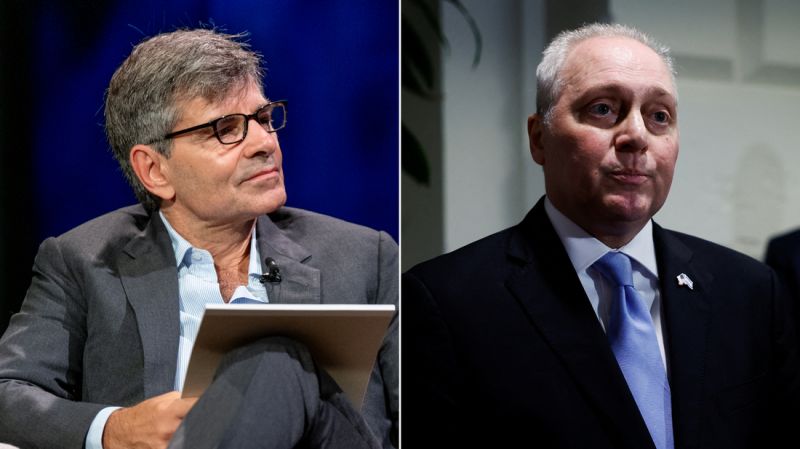Editor’s Note: A version of this article first appeared in the “Reliable Sources” newsletter. Sign up for the daily digest chronicling the evolving media landscape here.
How do you interview election deniers? George Stephanopoulos offered an example on Sunday.
In a remarkable exchange with Rep. Steve Scalise that aired on “This Week,” the ABC News anchor pressed the Republican House Majority Leader no less than a half dozen times on what should have been a simple and painless matter: unequivocally stating that the 2020 election was not stolen by President Joe Biden.
Scalise repeatedly attempted to evade the question, but Stephanopoulos held firm, relentlessly confronting the Republican again and again with the straightforward query.
“I asked you a very, very simple question. Now, I have asked, I think, the fifth time and you can’t appear to answer,” an exasperated Stephanopoulos said as the interview descended into a grilling. “Can you say unequivocally the 2020 election wasn’t stolen?”
Scalise never did offer a direct answer to the question (though you could argue his awkward dodging spoke volumes) and the interview ended after it was clear one would not be given. Stephanopoulos told me Monday that he was never going to move on to another topic until Scalise answered the unambiguous question, which proved impossible for the congressman.
“In my mind, if you can’t say the election is not stolen, why move on to other things? Why should anything else have any credibility?” Stephanopoulos rhetorically asked me when we chatted by phone.
“You don’t move on from whether an election is stolen,” Stephanopoulos added. “This is not just another policy debate, it is fundamental.”
Stephanopoulos declined to comment on how he believes other news anchors should approach the matter, but he said, for him, it’s really not too complicated.
“We are a democracy. A democracy is decided by elections. And the peaceful transfer of power, up until 2020, was at the heart of our democratic tradition,” Stephanopoulos told me. “If that can be called into question, then our whole democracy can be called into question. In my mind, it is a foundational question, the most fundamental question we face now as we head into the next election.”
While the answer is simple in Stephanopoulos’ mind, newsrooms have spent untold amounts of energy discussing and debating best practices for engaging with election deniers. Those discussions are closely tied with the most profound question that continues to bedevil the news media: How to best cover Donald Trump.
As the disgraced former president walked into court on Monday, news outlets were again forced to grapple with the issue, particularly the cable networks that had to decide in real-time whether to air his remarks live to the public. The progressive news channel MSNBC aired just a few moments, before quickly cutting away. The right-wing channel Fox News, predictably, did air Trump’s remarks. And CNN did as well, carrying in full Trump’s unhinged tirade against Biden, the New York attorney general and so-called “thugs” who he ranted “must hate our country.”
I asked Stephanopoulos about the uncertain waters that outlets once again found themselves in when covering such events. Do you carry Trump’s remarks live when he delivers them, particularly on days like Monday when he is in court? Do you believe, as some do, that they carry some inherent news value?
“I don’t think we should be in the business of airing falsehoods,” Stephanopoulos flatly said.
“The fact that he is going to court is newsworthy,” he added. “The falsehoods are not.”
The civil fraud trial in which Trump testified under oath on Monday, of course, only presented the first of many thorny decisions that newsrooms will have to make over the next year as the Republican frontrunner is summoned to court to face criminal charges. And the looming 2024 election will surely result in an uptick of 2020 election denialism, given the debunked conspiracy theory’s hold on the Republican Party.
These issues will, without question, continue to prompt significant debate among journalists. But for Stephanopoulos, well, the answers are quite apparent.
Read the full article here




